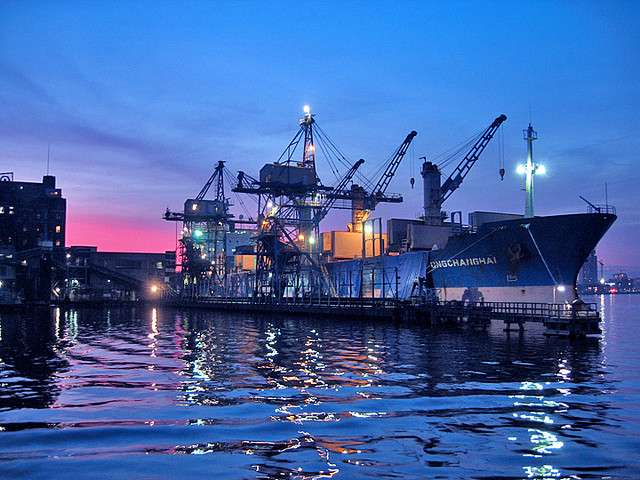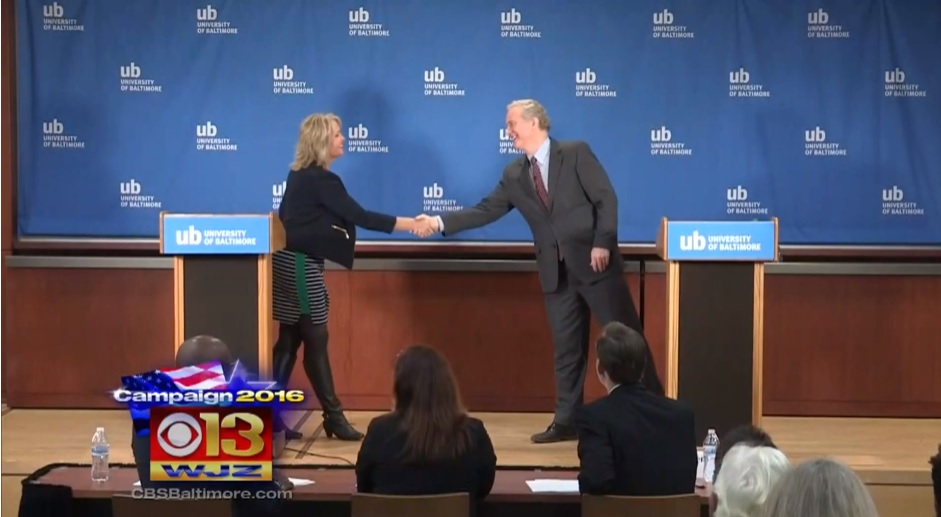By Joelle Lang, Auburn Mann and Troy Jefferson
Capital News Service
Presidential candidates in both parties are proposing changes to international trade policies that could have dramatic impacts not only on the United States in general, but also on busy trade centers like Maryland.
Republican Donald Trump has proposed a 45% tariff on imports to the United States.
More broadly, Trump has lambasted the Obama administration for making poor trade deals with China and other nations, agreements that the New York real estate tycoon insists should be scrapped for pacts more favorable to the United States.
On the Democratic side, Vermont Sen. Bernie Sanders has attacked former Secretary of State Hillary Clinton for supporting numerous trade agreements that he claims are costing Americans jobs and harming the global environment.
Trade is a closely-watched issue in Maryland, which hosts its presidential primary on Tuesday, along with Connecticut, Delaware, Pennsylvania and Rhode Island.
13th busiest port
Baltimore is home to the 13th-busiest port in the United States and could feel the impacts of more restrictive trade policies, according to a 2015 Logistics Management study.
The Port of Baltimore generates $2.9 billion in personal income, while contributing $310 million in state, county and municipal tax revenue annually, according to the Greater Baltimore Committee. The port conducts business with countries on six different continents.
In 2014, Greater Baltimore brought in $12 billion from exports of goods and services, according to the Greater Baltimore Committee’s Baltimore Metro Export Market Assessment of 2015.
The port of Baltimore directly generates 14,600 jobs, as well as 108,000 jobs statewide linked to port activity, according to James White, the executive director of the Maryland Port Administration.
“Without a healthy, vibrant and bustling Port of Baltimore, many of those jobs would be lost,” White wrote in The Daily Record’s 2015 report.
Trump’s trade threat
Trump uses trade as a prime example of why, in his view, the United States “doesn’t win any more.”
“The 45 percent tariff is a threat. It was not a tax, it was a threat. It will be a tax if they don’t behave,” the businessman explained at a March 10 debate.
“Take China as an example. I have many friends, great manufacturers, they want to go into China. They can’t. China won’t let them,” Trump continued. “We talk about free trade. It’s not true free trade; it’s stupid trade. China dumps everything that they have over here. No tax, no anything.”
In 2014, the most recent year data is available, the Port of Baltimore held the record for the fourth year in a row for handling more autos – a half million – than any U.S. port. The port added Fiat and Mazda to its client list in 2014.
The Baltimore port is also ranked first for its handling of farm equipment and machinery, imported forest products and imported machinery, according to the report.
Baltimore hosts one of two eastern U.S. ports with a 50-foot deep shipping channel and berth that can handle some of the world’s largest container ships that will soon be able to come through a wider and deeper Panama Canal from Asia.
Importance of free trade
Fred Mason, the president of the Maryland and District of Columbia AFL-CIO, called Trump’s assertions nonsensical and stressed the importance of free trade.
“America needs a strong manufacturing base to be an equal partner in world trade,” Mason said. “If we enter into trade agreements that our so lopsided until they only benefit one country, as we see with the proposed TPP (Trans Pacific Partnership), that’s not fair.”
Maryland is headquarters to many large companies engaged in international trade, including Under Armour and Black & Decker.
Based in Baltimore and dependent on the port for exports, Under Armour saw its sales skyrocket this past year, but could possibly feel the pinch of Trump’s trade policies.
The 20-year-old company is worth $500 million and its clothing products are sold in over 60 countries, including China. International net revenues made up 14% of $1 billion in total revenues for the first quarter released Thursday.
Under Armour did not return phone calls and emails seeking comment for this story.
If Trump’s trade policies were enacted, the nation would go into a recession, according to a study by Moody Analytics for the Washington Post. The country would lose 4 million jobs and 3 million would not be created, the study said.
TPP, the Trans-Pacific Partnership
Sanders is an avid critic of international trade agreements like the Trans-Pacific Partnership and the 24 year-old North American Free Trade Agreement (NAFTA), which established essentially unfettered trade among the United States, Canada and Mexico.
Sanders’ website refers to the TPP as “a disastrous trade agreement designed to protect the interests of the largest multi-national corporations at the expense of workers, consumers, the environment and the foundations of American democracy.”
The Trans-Pacific Partnership is a 12-country free trade agreement between the United States, Canada and 10 countries in the Asia Pacific region, which was drafted in 2015 and signed on Feb. 9.
During a Democratic primary debate in New Hampshire on Feb. 4, Sanders attacked Clinton’s stance on free trade, particularly the TPP, and referred to his consistent opposition to any recent trade deals.
“I was on the picket line in opposition to NAFTA. We heard people tell us how many jobs would be created,” said Sanders. “I didn’t believe that for a second because I understood what the function of NAFTA, CAFTA (Central American Free Trade Agreement), PNTR (Permanent Normal Trade Relations) with China, and the TPP is: it’s to say to American workers, hey, you are now competing against people in Vietnam who make 56 cents an hour minimum wage. This is an area where the secretary (Clinton) and I have disagreements.”
Clinton, who originally supported the TPP while serving as secretary of state during President Obama’s first term, now is against it.
During the same debate she explained: “I did hope that the TPP, negotiated by this administration, I was holding out hope that it would be the kind of trade agreement that I was looking for. Once I saw the outcome, I opposed it.”
Clinton still is ultimately for trade at some level. “We have to trade with the rest of the world,” she said. “That’s the way the global economy works.”
Trade war would hurt economy
J.D. Harrison, senior editor of digital content for the U.S. Chamber of Congress’ online forum, Above The Fold, argued that Trump’s plans to tax imports from Mexico and China would cause serious trouble for the economy.
“Under Trump’s trade plans, we would see higher prices, reduced spending power, fewer jobs, and a weaker economy, both here at home and abroad, according to the analysis,” Harrison said. “Of course, that’s the last thing our country and the global economy need right now.”
Harrison suggests that instead of implementing new restrictions, the United States should be opening more doors for international business.
“We should be tearing down trade barriers, not putting up more in place,” he said.
In the United States, trade supports 41 million jobs and boosts the average annual American household income by $13,600, according to U.S. Chamber of Commerce data.
Even so, some voters support Trump’s ideas about trade. At a rally Wednesday for Trump in Berlin, Md., Kathy Richardson, a retired state worker, said that America needs someone with Trump’s business acumen.
“We need someone like him for trade — he’s really good at making deals with other countries,” Richardson said. “He stands up for America.”
CNS reporter Rebecca Rainey contributed to this report.






The other comments on this article suggests that it is “excellent”, and that “information”like this will be lost due to the “coverage of election shenanigans”. That, of course, is his opinion, but he couldn’t be more wrong. And when I say that, I’m taking him at his word that he actually believes that and he’s not simply schilling for Cruz or Kasich.
But to correct the story, what Trump actually said was that China has been manipulating their currency to such an extent that in order for America to return to a level playing field, this country would be required to impose a tax of 45%. It was during an interview with the NYT editorial board who did not have the honesty of clearing up his answer during the interview, since they figured they could burn hm with it later.
Trump, of course, cleared it up the next day and stated that what he meant was that “if necessary”, this country would have to consider some kind of a sanction (tariff) against China if they would not cease and desist from manipulating their currency to the disadvantage of this country. He clearly intended that as a threat to “encourage” China not to continue cheating.
This article is little more than an anti-Trump screed, but who’s not surprised about that? The media has been in bed with the corporatists and the lobbyists for every bad trade deal that this country has entered into (NAFTA, ASEAN, CEFTA,GAFTA etc.) and their are dozens of multilateral “are trade” agreements that benefit the special interests group and countries that push them. Every single one of them are detrimental to the workers and small businesses of this nation. there have been countless articles written in condemnation of each one of them.
Trump has said repeatedly that he is in favor of free trade (bi-lateral only as opposed to multilateral), but he wants it to be “fair trade”. It makes absolutely no sense for American companies and American workers for the US to enter into trade agreements that only benefit the foreign countries and “specific” large corporations (that actually write the agreements themselves), such as GE, APPLE, FORD, GOOGLE, NABISCO, et al.
The reason this country is in serious trouble is because of the media who have convinced many gullible Americans to support the politicians who end up in bed with the lobbyists representing the large corporations. The media refuses to talk about the serious issues that are facing this country and do all in their power to divide the nation among groups blacks/whites, gays/straights, women/men, old/young, rich/poor, etc. They then successfully pick these groups off one at a time.
But the supporters of Trump have not bought into these false divisions. Moreover, they reject the notion that the divisions among Americans are between”conservative/liberal”, “left/right” or even “Democrat/Republican”. They, correctly see the divide as being between “honest representation and corruption”. The Trump supporters see Trump as the first candidate that they’ve ever known who actually can’t be bought. He has his own money. He also eschews political correctness and says what he actually believes. This approach scares the daylights out of those who want to control Americans for whatever reasons.
Trump is actual this country’s last shot at keeping and maintaining a “sovereign” nation.
An excellent article that shows how Trump’s tariff proposal and Sanders’ trade policies will hurt Baltimore.
Too bad that information like this is lost to the coverage of the election shenanigans…